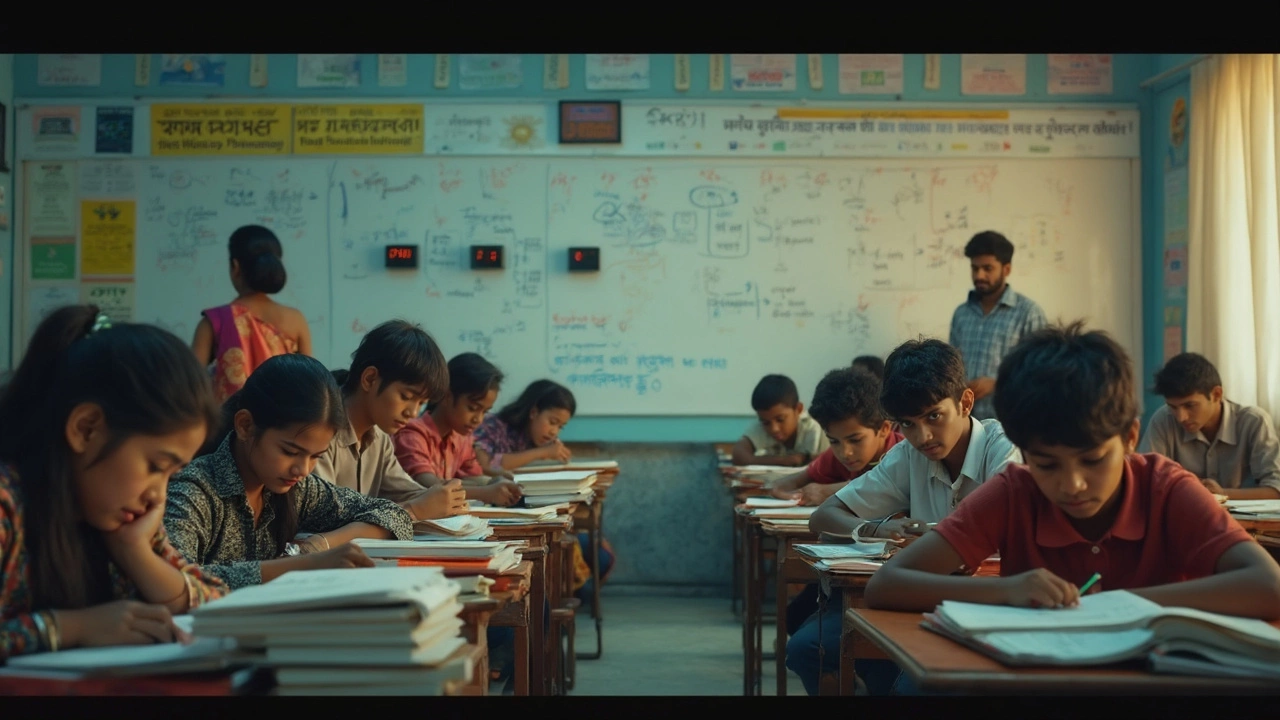
Every year, talk about the IIT JEE gets louder—friends, family, even YouTube makes it sound like this exam is a beast. Over 1.5 million students give it a go every year, and only about 1% end up making it to the top IITs. That number alone grabs your attention. If you’re gearing up for it, you’ve probably heard stories of people studying 10-12 hours a day, solving hundreds of problems, and still sweating on the big day.
But is IIT JEE really the 'Mount Everest' of Indian exams, or are there other contenders in the ring? The answer isn’t just about the syllabus or how hard the questions are—it’s about how everything comes together. Understanding what you’re up against can actually help you plan smarter. Before you start panicking about the hype, let’s break down what makes JEE so tough, how it compares with other big exams, and what you can do differently.
- Why People Call IIT JEE the Toughest
- What Actually Makes IIT JEE So Hard
- How Does IIT JEE Stack Up Against Other Exams?
- Cracking the Pattern: Insider Prep Tips
- The Truth: Is Toughest Always Best?
Why People Call IIT JEE the Toughest
The IIT JEE has a wild reputation in India, and not without reason. The numbers alone make it clear. In 2024, about 1.7 million students appeared for JEE Main, hoping to qualify for JEE Advanced, but only the top 2.5 lakh (that’s less than 15%) even got a shot at that second round. Out of those, just under 17,000 made it to a seat at one of the 23 IITs. The cut-throat odds crank up the pressure from day one.
People see IIT JEE as the toughest because it’s not just about memorizing formulas or slogging through textbooks. The questions test if you really get the concepts—sometimes from topics you thought were a breeze. The paper is designed to throw curveballs. You have to think fast, connect ideas from physics, chemistry, and math, and spot tricks the examiners slip in.
- Wide Syllabus: The syllabus covers almost everything you’ve learned in Classes 11 and 12, sometimes even digging into lesser-noticed corners. Skipping topics isn’t really an option if you want a good rank.
- Unpredictable Pattern: There’s no fixed blueprint year after year. One year, math might be a brain-buster. Another year, chemistry could be the real headache.
- Stress and Competition: Everyone is competing for a few thousand seats, and stakes are high. Even a silly mistake or a bad day can push you down the rank list.
Check out these stats from recent years that show just how stiff the competition is:
| Year | JEE Main Applicants | JEE Advanced Qualified | Seats in IITs |
|---|---|---|---|
| 2022 | 1,500,000 | 250,000 | 16,598 |
| 2023 | 1,600,000 | 250,000 | 17,385 |
| 2024 | 1,700,000 | 250,000 | 17,900 |
The numbers tell their own story. That’s why folks say cracking IIT JEE means you’ve got not just smarts, but also nerves of steel and real staying power.
What Actually Makes IIT JEE So Hard
If you talk to anyone who’s tried their hand at the IIT JEE, one thing always comes up: this exam is brutal. But what exactly makes it such a monster? It's not just tough math problems or physics questions—it's a combination of several factors coming at you all at once.
First, the sheer volume of the IIT JEE syllabus is massive. You're expected to remember topics from three entire subjects (Maths, Chemistry, Physics) from class 11 and 12. That’s over a hundred chapters and thousands of possible types of problems. Missing even one topic can hurt your score big time.
Next up, the competition. With more than 1.5 million students appearing for the exam each year and only about 16,000 open seats in top IITs, the acceptance rate hovers around 1%. That’s tougher than most Ivy League colleges!
| Year | JEE Main Applicants | JEE Advanced Qualified | IIT Seats | Selection Rate |
|---|---|---|---|---|
| 2023 | 1,200,000 | 200,000 | 16,000 | 1.3% |
| 2024 | 1,500,000 | 210,000 | 17,400 | 1.2% |
Then there's the problem-solving style. The IIT JEE doesn’t just test if you memorized formulas. The questions often blend concepts together in ways you don’t see in regular school exams. You might get a physics problem hiding a tricky math twist or a chemistry question that needs real-world reasoning.
Time pressure is another big deal. The exam isn't about just knowing the answer. You need to solve each problem quickly and accurately, often under a minute. If you freeze up, even if you know the concept, you lose good marks.
Also, the paper setters love to challenge your basics. They expect absolute clarity—no guesswork. Sometimes, the options are so close that one tiny mistake means losing out big. And negative marking? Yeah, that’s in place, so wild guesses can backfire.
Put all this together—huge syllabus, crazy competition, hard-to-decipher questions, major time crunch, and negative marking—and it becomes clear why so many call IIT JEE the toughest exam in India.

How Does IIT JEE Stack Up Against Other Exams?
If you’re wondering if the IIT JEE is in a league of its own, it’s worth lining it up next to other major entrance tests in India. NEET (for medical streams), UPSC Civil Services, and CAT are all mentioned as super tough, but each has its own vibe.
Let’s look at some numbers you’ll actually care about:
| Exam | Applicants (2024) | Selection Rate | Main Challenge |
|---|---|---|---|
| IIT JEE | ~1,700,000 | ~1.13% | Conceptual depth, competition |
| NEET | ~2,400,000 | ~1.6% | Speed, accuracy, high cutoff |
| UPSC CSE | ~1,100,000 | <0.3% | Vast syllabus, multiple rounds |
| CAT | ~300,000 | ~2% | Percentile game, unpredictable |
Sure, IIT JEE feels brutal because almost everyone going in has a solid academic record, tons of coaching, and is determined as hell. Unlike NEET, where biology is the big focus, JEE expects you to nail Math, Physics, and Chemistry—all at a crazy high level. It’s not just memorizing; the paper wants you to really “get” the subject. People often say the questions test your brain, not your memory.
UPSC Civil Services? That exam takes months, has multiple rounds (Prelims, Mains, Interviews), and covers everything from history to ethics. Its success rate is even lower, but the kind of prep (and pressure) is different: more about general awareness and long-term planning compared to JEE’s raw problem-solving speed.
CAT isn’t a piece of cake either, especially with its percentile system where scoring even 99 doesn’t always guarantee your dream IIM seat. But CAT tests logic, language, and data skills rather than the raw technical grind of JEE.
So, if we’re being honest, no one-size-fits-all tag of 'toughest' works here. But if you care about high-level math, relentless problem practice, and fierce competition, IIT JEE is easily among the hardest out there.
Cracking the Pattern: Insider Prep Tips
Most people think cracking the IIT JEE is all about raw intelligence or superhuman memory, but that's not how the toppers make it. Real talk: it’s about understanding the pattern, staying consistent, and building smart routines. Let’s get into what actually works.
First off, don’t try to study everything. The JEE sticks to the syllabus, and previous years’ trends show that about 70-80% of questions come from certain high-weightage chapters. So chasing every tiny topic is a waste of time. It's smarter to master the main concepts before even looking at the super advanced stuff.
- Past Papers Are Gold: Don’t just solve them—analyse them. Notice which topics pop up the most. If Magnetism in Physics keeps showing up, give it more time.
- Mock Tests Matter—Big Time: Lots of students ignore them at first, but toppers swear by full-length tests under real exam timing. Get used to pressure, and learn from every silly mistake.
- Time Blocking, Not Endless Study: Staring at books for 10 hours doesn’t mean you’re learning. Instead, break days into blocks—maybe two hours Physics, short break, then Maths, and so on. Apps and planners can help you stick to it.
- Formula & Concept Sheets: Keep these on hand. Flashcards or a small notebook can save you in revisions, especially as exam day comes closer.
- Don’t Skip NCERTs: For Chemistry especially, NCERT textbooks are the go-to resource. Weirdly, lots of questions every year are direct lifts or just tiny twists from these books.
Here's a quick look at what successful JEE aspirants practice (based on last year's survey among top 500 rankers):
| Strategy | Percentage Who Used It |
|---|---|
| Solving past 10 years' papers | 93% |
| Weekly mock tests | 88% |
| Concept summary notes | 74% |
| NCERT revision (Chemistry) | 91% |
If you’re wondering about fancy coaching vs. self-study, here’s the truth: More than 30% of the students in top 1000 ranks did not attend any famous coaching institute. They just picked the right study material, stuck to a routine, and didn’t get distracted when things got tough.
Bottom line? IIT JEE is a pattern game. Adjust the way you prep, keep a close eye on your mistakes, and focus on high-value chapters. Every hour you spend working smart counts double compared to random cramming.

The Truth: Is Toughest Always Best?
Everyone talks about cracking the IIT JEE like it’s the ultimate test of intelligence. But here’s something people don’t really say out loud: being the “toughest” doesn’t always mean it’s the “best” choice for everyone.
First, let’s talk facts. The JEE is famous for being tough, but what makes it feel that way? For one, the acceptance rate to the top IITs is shockingly low—usually around 1% each year. Still, there are other dead-serious exams in India like the UPSC Civil Services or medical NEET. For example, UPSC has an even lower success rate—sometimes less than 0.2% of applicants make it into the top administrative services.
| Exam | Number of Applicants | Selection Rate |
|---|---|---|
| IIT JEE (Advanced) | ~2.5 lakh | ~1% |
| NEET | ~20 lakh | ~7% |
| UPSC CSE | ~10 lakh | ~0.2% |
Here’s the kicker: the “toughest” tag is all about competition, but it doesn’t automatically mean better. If you love solving math and science problems and dream of being an engineer, IIT JEE might be the perfect battle for you. But if your strengths lie elsewhere, spending years just fighting for a low acceptance rate may not get you the career win you actually want.
Don’t forget the exam difficulty is just part of the story. The quality of colleges, career outcomes, and even happiness after entering the chosen field matter more than just bragging rights. Tons of people crack IIT JEE, join an IIT, and then realize what they really wanted was somewhere else—maybe medicine, design, coding, or business.
So, ask yourself: Are you chasing IIT JEE just because it’s the “toughest”? Or is it something you really want? Instead of getting locked in the toughest-for-the-sake-of-toughest mindset, match your prep and energy to your genuine interests and goals. That’s where you’ll really win.






